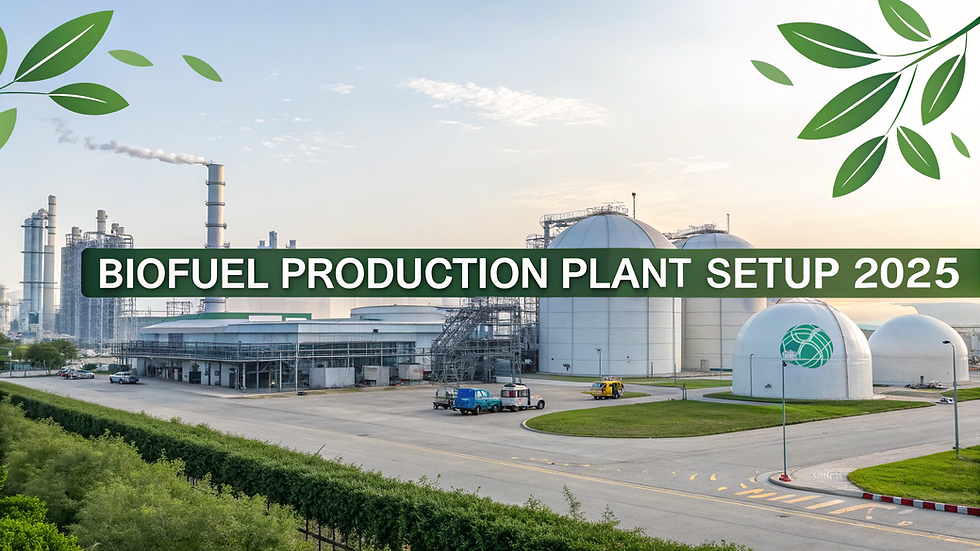Biofuel Production Cost Report 2025: Feasibility Study, Plant Setup, and Profitability Insights
- yogeshimarc
- Oct 10
- 4 min read
Biofuel is a renewable energy source derived from organic materials such as crops, agricultural residues, algae, and waste biomass. It serves as an alternative to conventional fossil fuels, reducing greenhouse gas emissions and promoting energy sustainability. Common biofuels include bioethanol, biodiesel, and biogas, which can be used in transportation, power generation, and heating applications. Biofuels are gaining prominence globally due to environmental concerns, government policies supporting clean energy, and the growing demand for sustainable fuel solutions across industries.
Setting up a biofuel production plant involves sourcing feedstock, installing processing units for fermentation, transesterification, or anaerobic digestion, and establishing storage and distribution infrastructure. Proper machinery, quality control systems, and compliance with environmental regulations are critical. With careful planning, investment in technology, and operational efficiency, entrepreneurs can produce sustainable biofuels to meet rising energy demand and support eco-friendly initiatives.
IMARC’s new report titled “Biofuel Production Cost Analysis 2025: Industry Trends, Plant Setup, Machinery, Raw Materials, Investment Opportunities, Cost and Revenue” provides a comprehensive roadmap for setting up a biofuel production plant cost. The study encompasses all the essential information needed to enter the biofuel industry, including capital investment, operating costs, raw material requirements, and profit projections. The biofuel production cost analysis offers detailed insights into cost structures and economic feasibility, helping stakeholders make informed decisions. It is a valuable resource for entrepreneurs, investors, researchers, consultants, business strategists, and anyone with an interest or stake in the biofuel sector.
Request for a Sample Report: https://www.imarcgroup.com/biofuel-manufacturing-plant-project-report/requestsample

Latest News & Developments:
In Assam, India, the world’s first large‐scale bamboo-based 2G bio-ethanol plant was inaugurated in September 2025. It will process about 500,000 tonnes of bamboo annually, producing ethanol plus by-products such as furfural, acetic acid, and food-grade CO₂, helping with blending mandates and supporting rural incomes.
In Spain, a major second-generation biofuel plant is under construction in Huelva (Palos de la Frontera). The plant will be equipped to produce Sustainable Aviation Fuel (SAF) and renewable diesel (HVO) from agricultural waste and used cooking oils. It’s estimated at €1.2 billion cost and will have a capacity of about 500,000 tonnes per year.
Key factors for setting up a biofuel production plant:
1. Market Research
The increasing investments in research and development for advanced biofuel formulations with enhanced properties are fostering market expansion. The shift toward eco-friendly materials in plastic processing is prompting manufacturers to incorporate biofuel-based stabilizers in consumer goods and packaging. Additionally, the growing demand for high-performance catalysts in petrochemical and chemical industries is supporting the adoption of biofuel. Innovations in nanotechnology and material science are leading to the development of modified biofuel for advanced medical and industrial applications. Furthermore, the expansion of regulatory frameworks promoting the reduction of hazardous materials in manufacturing is further creating lucrative opportunities for the market.
The report offers an exhaustive overview of the global biofuel industry, including a detailed breakdown by segments and regions within the sector. It also includes in-depth analyses of prices involved, market trends and historical data and forecast.
Market Forecast
Price Analysis
Market Breakup by Region
Market Breakup by Segment
Market Trends
2. Planning and Designing
A detailed and up-to-date business plan is indispensable for mapping out the steps to establish and operate a biofuel production facility. This report offers in-depth details about the process flow and the various unit operations involved in a biofuel production plant.
Technical Tests
Quality Assurance Criteria
Mass Balance and Raw Material Requirements
Unit Operations Involved
Product Overview
3. Legal and Regulatory Compliance
Understanding and complying with the intricate framework of business laws and regulations is a vital aspect of establishing a biofuel production facility. This requires a detailed knowledge of legal obligations, such as labor laws, environmental standards, tax policies, and industry-specific regulations.
Ask Analyst for Customization: https://www.imarcgroup.com/request?type=report&id=21321&flag=C
4. Plant Requirements and Costs
The report offers a detailed location analysis, including insights into land selection, key criteria, location importance, environmental considerations, and associated costs for establishing a biofuel production facility. It also provides information on plant layout and the factors that impact its design.
Human Resource Requirements and Costs
Utility Requirements and Costs
Transportation Requirements and Costs
Packaging Requirements and Costs
Raw Material Requirements and Costs
Machinery Requirements and Costs
Plant Layout
Land, Location and Site Development
5. Hiring and Training
Effective workforce planning and recruitment strategies are critical for assembling a skilled and efficient team to manage a biofuel production plant. This process includes identifying the specific skills and qualifications needed for different roles and anticipating future staffing requirements based on production goals and business expansion.
Developing Health and Safety Protocols
Implementing Training Programs for Employees
Complying with Labor Laws and Regulations
6. Supply Chain Management
Building strong partnerships with suppliers and vendors is crucial to maintaining a dependable and cost-efficient supply chain. This requires choosing partners who can reliably deliver high-quality raw materials and components at competitive rates.
Planning Logistics and Transportation Networks
Implementing Efficient Inventory Management Systems
7. Project Economics
This entails a thorough analysis of the costs associated with a biofuel production plant, covering capital expenditure (CapEx), operating expenditure (OpEx), income forecasts, taxation, depreciation, liquidity, profitability, payback period, net present value (NPV), uncertainty, sensitivity assessments, etc. In addition to this, it includes an in-depth review of financial assistance options and a comprehensive list of certifications necessary for establishing the plant.
Financial Analysis
Profit Projections
Taxation and Depreciation
Revenue Projections
Expenditure Projections
Operating Costs
Capital Investments
8. Marketing and Distribution Strategies:
Creating a robust marketing strategy and establishing strong brand positioning are vital for building a production plant's market presence. This process includes conducting thorough market research to identify customer needs, preferences, and competitive trends.
Identifying Distribution Channels and Sales Networks
Leveraging Digital Marketing and E-Commerce Platforms
Participating in Trade Shows and Industry Events
About Us:
IMARC Group is a global management consulting firm that helps the world’s most ambitious changemakers to create a lasting impact. The company excel in understanding its client’s business priorities and delivering tailored solutions that drive meaningful outcomes. We provide a comprehensive suite of market entry and expansion services. Our offerings include thorough market assessment, feasibility studies, company incorporation assistance, factory setup support, regulatory approvals and licensing navigation, branding, marketing and sales strategies, competitive landscape, and benchmarking analyses, pricing and cost research, and procurement research.
Contact Us:
IMARC Group
134 N 4th St. Brooklyn, NY 11249, USA
Email: sales@imarcgroup.com
Tel No:(D) +91 120 433 0800
United States: (+1-201971-6302)






Comments